Items
Subject is exactly
Immigration
-
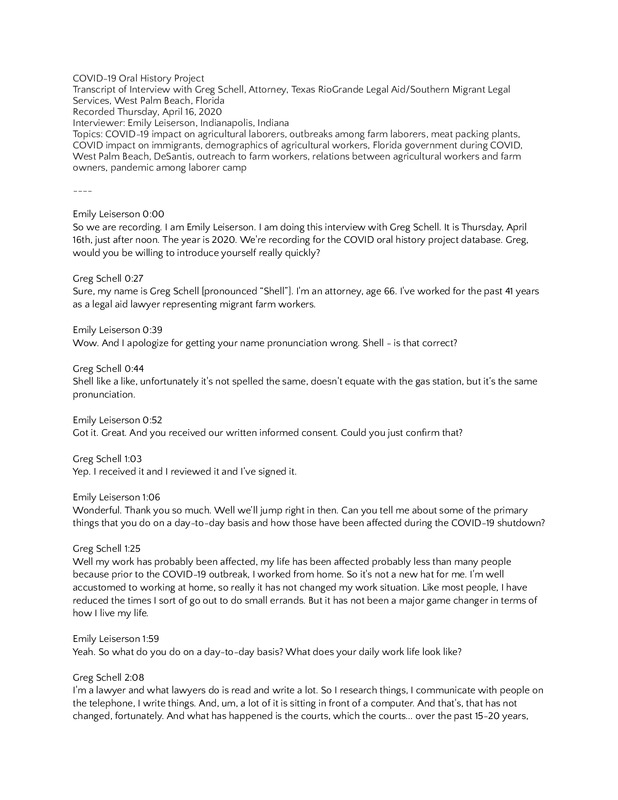 04/16/2020
04/16/2020Greg Schell Oral History, 2020/04/16
-
 2021-09-11
2021-09-11Essential Immigrant Stories - Photo Book 2021
Essential Immigrant Stories is a photo-documentary project by visual artist and photographer, Arlette Cepeda, that focuses on highlighting the challenges and opportunities the COVID-19 pandemic has created for Staten Island’s immigrant community members through portraits and accompanying stories. The goal of this project is to elevate and validate the immigrant experience and their impact in our Staten Island community. “Through portraits and accompanying short stories, I'm interested in documenting the experiences of the often neglected, silenced or omitted immigrant population of this particular north-shore neighborhood.” “It is my hope that this project can help create awareness, increase empathy, acceptance and understanding of our otherness, narrowing the divide and discrimination often faced by immigrants.” - Arlette Cepeda -
2020-06-22
Milestone Year
To get to this story, I have to go back a few years first. I'm an immigrant from El Salvador. I came to the U.S. as a teenager in 1994, and never went back. I was in my 30s when I decided it was finally time to visit the grandmother I'd been missing for so long. I started to save and plan. Then she died. It took several years before I finally took my first trip back in November of 2019. I spent the time vacationing on the coast. I avoided my grandmother's house, my friends, and my family. I wasn't ready. But I decided that for my 40th birthday, in 2020, I'd return for a longer stay and visit my childhood home and all the friends and family left behind. Then there was a pandemic. The trip was cancelled, but it was the least of that year's problems. I lost my job and went back to school to start a new career. Our dog got cancer and died. My partner had a friend in El Salvador who died of COVID. I can never reschedule that same trip. Too much has changed. I'm planning to return this summer. This time with a firmer grasp on life's impermanence. I want to visit the white sand beaches at Playa Mango before it gets turned into a "surf city" tourist trap. I want to visit all the important cultural landmarks, especially those from which I can learn about my ancestors. More importantly, I will not avoid friends and family. On the contrary, I want to cherish the time I will have with them as if the next day isn't guaranteed. I plan to take dozens of photographs, portraits of everyone I see, I want to write down their stories in my journal, I want to record every visit, every meal, every experience possible in my journal. I plan to say "see you later," but not leave anything unsaid. Just in case. -
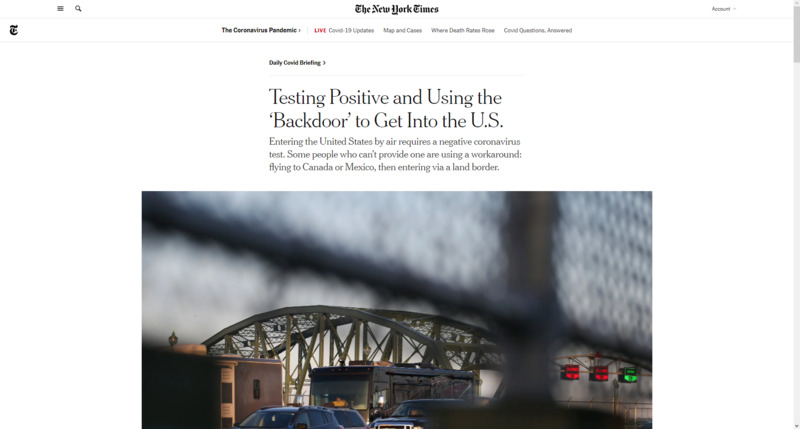 2022-05-28
2022-05-28Testing Positive and Using the ‘Backdoor’ to Get Into the U.S.
This is a news story from the New York Times by Ceylan Yeginsu. This is about how people have been finding ways to bypass restrictions while traveling. Land crossings are a way some people are doing this, since land crossing does not require testing for entry into some countries. One way this could be done is doing the mandatory self-isolation period of five days, than choosing a different flight to a country like Mexico first, to then cross into the United States by land to avoid the ten day isolation required for testing positive for COVID. This article is quite interesting because it shows the ways in which COVID restrictions can be bypassed through loopholes within the framework. I have no idea the amount of people that actually do this, but at least a few have noticed ways to get out of restrictions. -
 2020-04-03
2020-04-03My Neighbors and I
My neighbors and I have known each other for multiple years, and are good friends. They came from India as immigrants back in 2000 and started a family, eventually moving in right next to us about two years before the pandemic. Once COVID hit, our usual Saturday night bonfires together came to a halt as we wanted to be safe and not spread the potential infection. Instead, they bought an entire fire pit off Amazon, and through the trees each Saturday night we continued our Saturday night bonfires together, just not next to each other. This was honestly a beautiful experience because no matter what we found a way to continue to connect with each other in a safe and timely manner! We still keep in contact to this day and reminisce on our old memories as neighbors. -
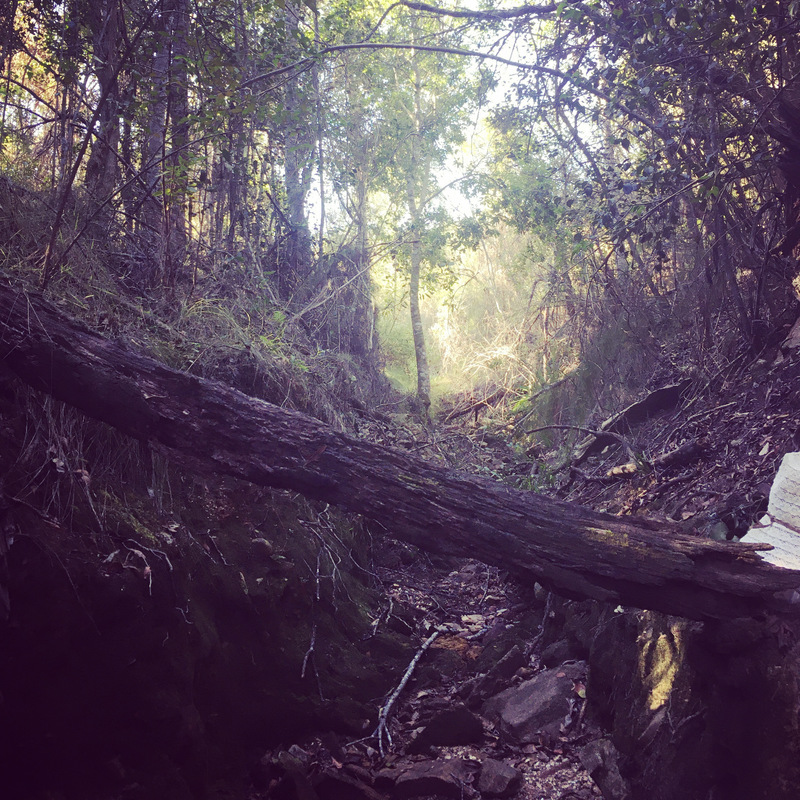 2020-04-26
2020-04-26A World Apart
Nearly a decade ago, I immigrated to South Africa. At the time of the start of the pandemic, my partner and I had been struggling with our visa papers and it had been 7 years of fighting with Home Affairs. March 2020 saw the closure of Home Affairs, a national state of emergency with nearly a year of stay-at-home orders from the government, curfew, and limited access to the public sphere, and for the first time, a reprieve from the nightmares of the immigration process. Just like that, in a single memo to the public, Home Affairs resolved all of its bureaucracy, in favour of public safety, and my partner and I were able to stay in the same place together for over 18 months. The longest we'd been able to stay together since immigrating. In a situation that saw so much upheaval, pain, uncertainty, and widespread panic, I found precious moments of peace and safety. I felt lucky and guilty all at once. Living in a rural forest community in the mountains, with my nearest neighbour over a mile away, stay-at-home orders had little impact on my daily life and I was able to relish time at home with the people who mean the most to me. All the while, stories of social and political dissent and unrest played a continual reminder that not all was right with the world, that my experience was unique and world's apart from the collective pandemic experience. I was made painfully aware that this global phenomenon, one that connected people so thoroughly and completely, was a deeply and fundamentally separate experience for myself. I have a privileged, unique, and unusual story of joy and peace experiencing the pandemic. As an American in another country, I was able to see first hand what a nation with limited resources could do when it decided to put public health and safety above all else. The pandemic provided me with my very first experience of feeling wholly communally supported, safe, and protected. This is a story I want to share because so many people were deeply traumatised by their government's response to covid and the subsequent fallout of the lack of support, and for them to know that it was no failing on their part for feeling like they were put through a meat grinder. Every single person on this planet deserved to experience the ease and simple joy that I was granted, and in a world with such immense wealth, there is honestly no excuse for why my experience was so unique. -
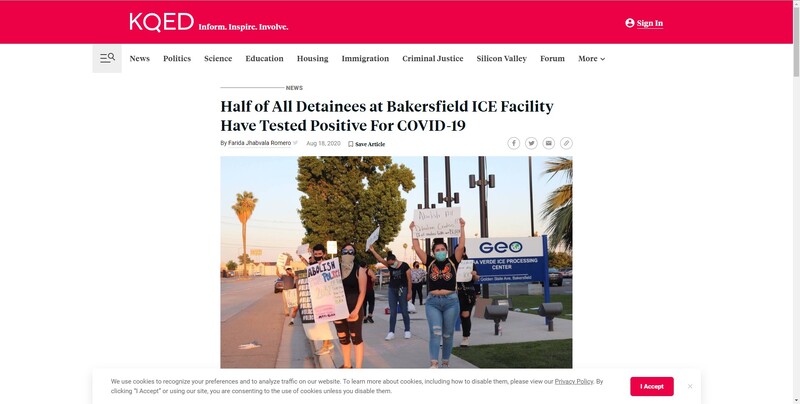 2021-01-01
2021-01-01How was life like before covid 19 impact happened
before the pandemic happened I didn't have to worry about getting sick with my weak immune system but when covid happened I had to take extra precautions on what I do so I wouldn't catch covid -
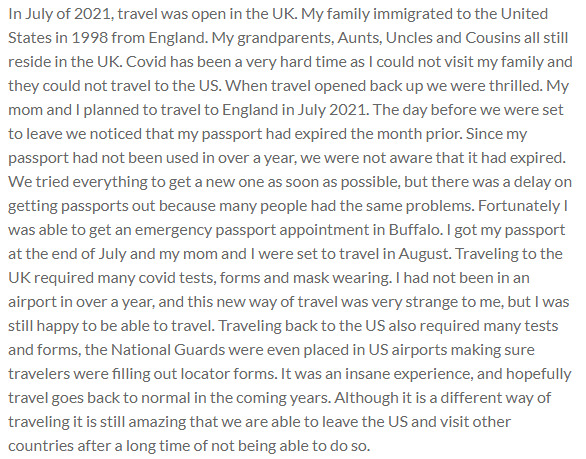 2021-07
2021-07Traveling During Covid
In July of 2021, travel was open in the UK. My family immigrated to the United States in 1998 from England. My grandparents, Aunts, Uncles and Cousins all still reside in the UK. Covid has been a very hard time as I could not visit my family and they could not travel to the US. When travel opened back up we were thrilled. My mom and I planned to travel to England in July 2021. The day before we were set to leave we noticed that my passport had expired the month prior. Since my passport had not been used in over a year, we were not aware that it had expired. We tried everything to get a new one as soon as possible, but there was a delay on getting passports out because many people had the same problems. Fortunately I was able to get an emergency passport appointment in Buffalo. I got my passport at the end of July and my mom and I were set to travel in August. Traveling to the UK required many covid tests, forms and mask wearing. I had not been in an airport in over a year, and this new way of travel was very strange to me, but I was still happy to be able to travel. Traveling back to the US also required many tests and forms, the National Guards were even placed in US airports making sure travelers were filling out locator forms. It was an insane experience, and hopefully travel goes back to normal in the coming years. Although it is a different way of traveling it is still amazing that we are able to leave the US and visit other countries after a long time of not being able to do so. -
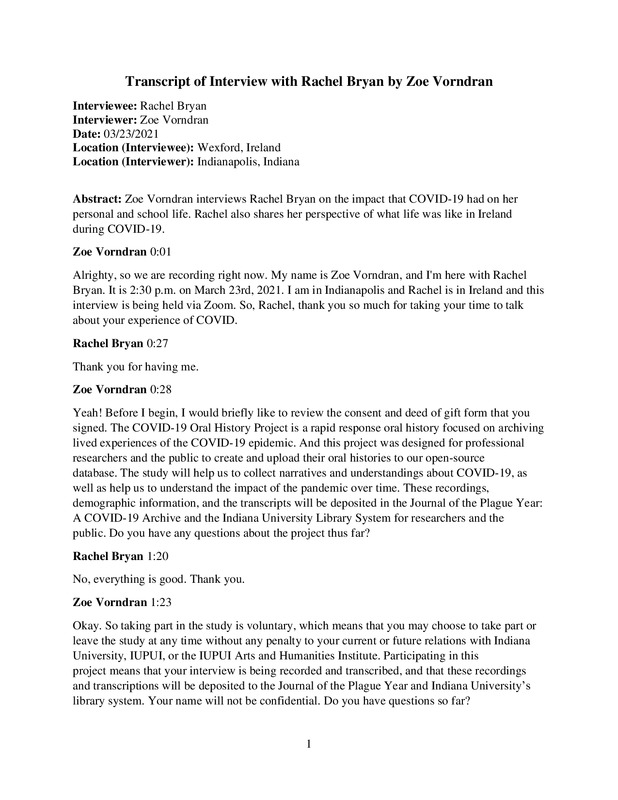 04/06/2021
04/06/2021Rachel Bryan Oral History, 2021/04/26
-
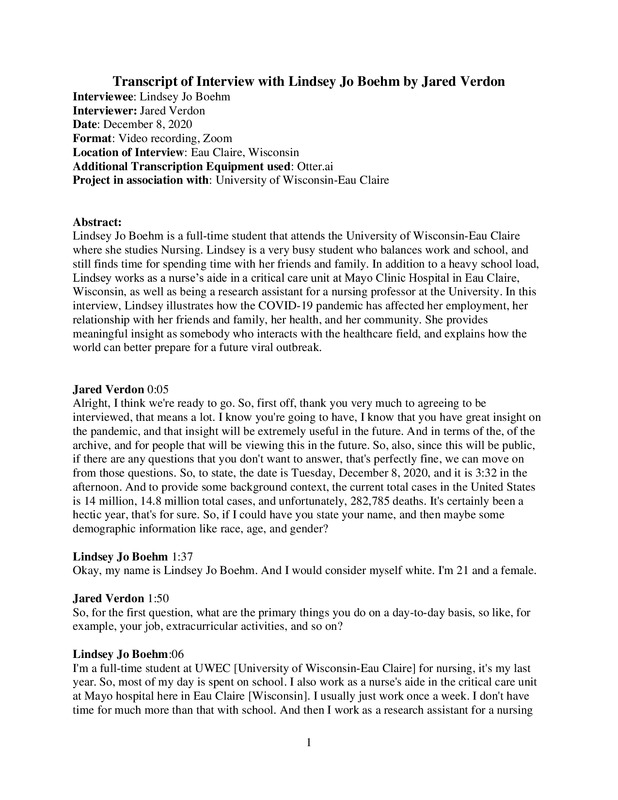 12/08/2020
12/08/2020Lindsey Jo Boehm Oral History, 2020/12/08
Lindsey Jo Boehm is a full-time student that attends the University of Wisconsin-Eau Claire where she studies Nursing. Lindsey is a very busy student who balances work and school, and still finds time for spending time with her friends and family. In addition to a heavy school load, Lindsey works as a nurse’s aide in a critical care unit at Mayo Clinic Hospital in Eau Claire, Wisconsin, as well as being a research assistant for a nursing professor at the University. In this interview, Lindsey illustrates how the COVID-19 pandemic has affected her employment, her relationship with her friends and family, her health, and her community. She provides meaningful insight as somebody who interacts with the healthcare field, and explains how the world can better prepare for a future viral outbreak. -
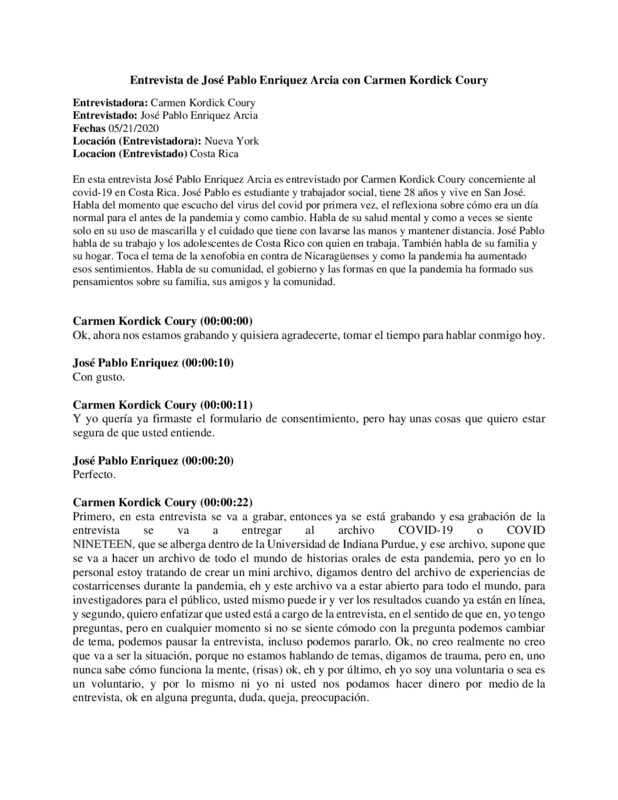 05/21/2020
05/21/2020José Pablo Enriquez Arcia Oral History, 2020/05/21
En esta entrevista José Pablo Enriquez Arcia es entrevistado por Carmen Kordick Coury concerniente al covid-19 en Costa Rica. José Pablo es estudiante y trabajador social, tiene 28 años y vive en San José. Habla del momento que escucho del virus del covid por primera vez, el reflexiona sobre cómo era un día normal para el antes de la pandemia y como cambio. Habla de su salud mental y como a veces se siente solo en su uso de mascarilla y el cuidado que tiene con lavarse las manos y mantener distancia. José Pablo habla de su trabajo y los adolescentes de Costa Rico con quien en trabaja. También habla de su familia y su hogar. Toca el tema de la xenofobia en contra de Nicaragüenses y como la pandemia ha aumentado esos sentimientos. Habla de su comunidad, el gobierno y las formas en que la pandemia ha formado sus pensamientos sobre su familia, sus amigos y la comunidad. -
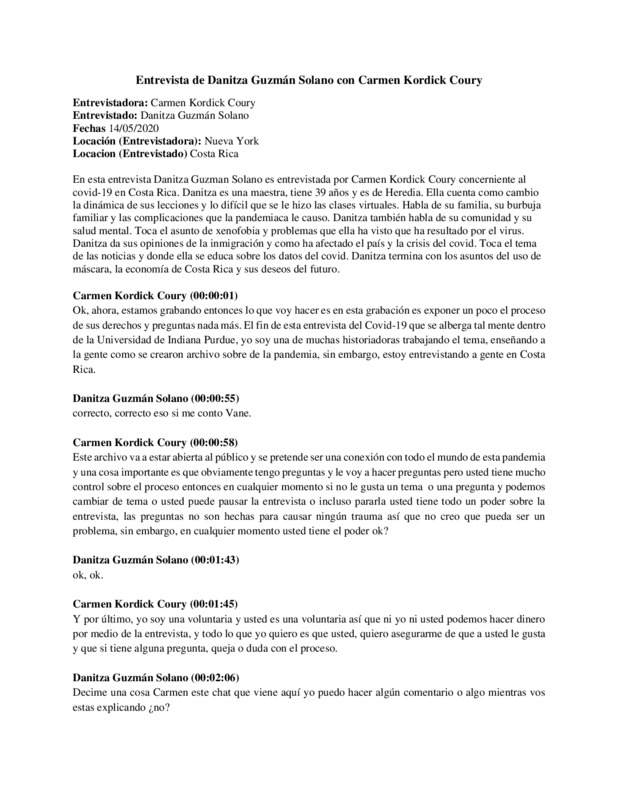 05/14/2020
05/14/2020Danitza Guzman Solano Oral History, 2020/05/14
En esta entrevista Danitza Guzman Solano es entrevistada por Carmen Kordick Coury concerniente al covid-19 en Costa Rica. Danitza es una maestra, tiene 39 años y es de Heredia. Ella cuenta como cambio la dinámica de sus lecciones y lo difícil que se le hizo las clases virtuales. Habla de su familia, su burbuja familiar y las complicaciones que la pandemiaca le causo. Danitza también habla de su comunidad y su salud mental. Toca el asunto de xenofobia y problemas que ella ha visto que ha resultado por el virus. Danitza da sus opiniones de la inmigración y como ha afectado el país y la crisis del covid. Toca el tema de las noticias y donde ella se educa sobre los datos del covid. Danitza termina con los asuntos del uso de máscara, la economía de Costa Rica y sus deseos del futuro. -
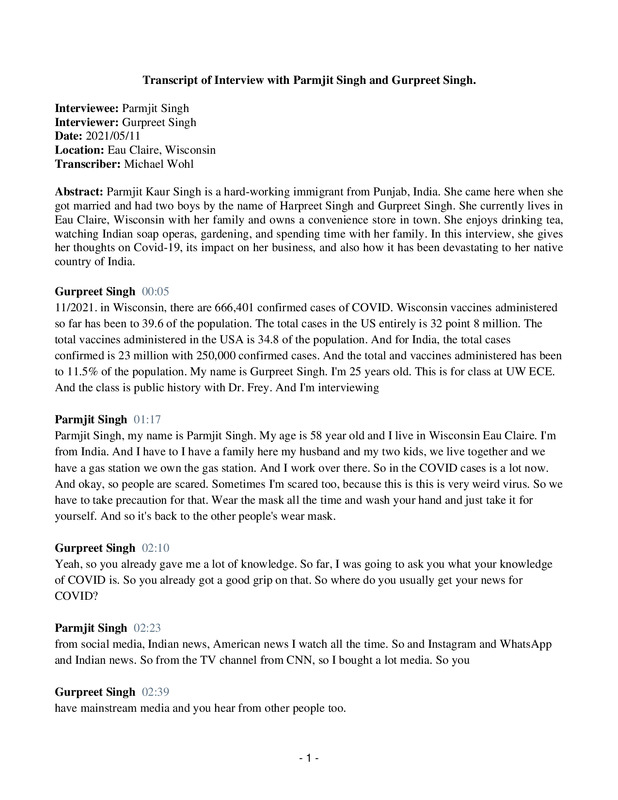 05/11/2021
05/11/2021Parmjit Singh Oral History, 2021/05/11
Parmjit Kaur Singh is a hard-working immigrant from Punjab, India. She came here when she got married and had two boys by the name of Harpreet Singh and Gurpreet Singh. She currently lives in Eau Claire, Wisconsin with her family and owns a convenience store in town. She enjoys drinking tea, watching Indian soap operas, gardening, and spending time with her family. In this interview, she gives her thoughts on Covid-19, its impact on her business, and also how it has been devastating to her native country of India. -
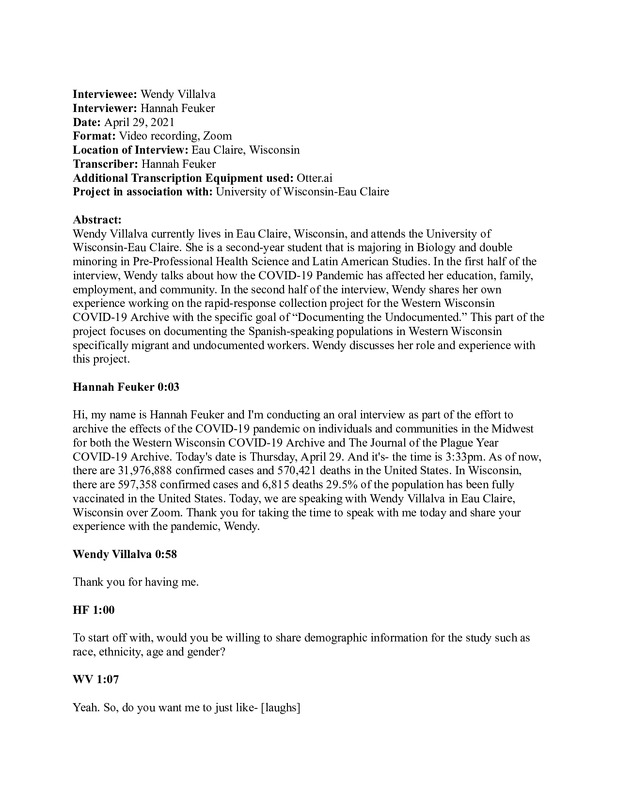 04/29/2021
04/29/2021Wendy Villalva Oral History, 2021/04/29
Wendy Villalva currently lives in Eau Claire, Wisconsin, and attends the University of Wisconsin-Eau Claire. She is a second-year student that is majoring in Biology and double minoring in Pre-Professional Health Science and Latin American Studies. In the first half of the interview, Wendy talks about how the COVID-19 Pandemic has affected her education, family, employment, and community. In the second half of the interview, Wendy shares her own experience working on the rapid-response collection project for the Western Wisconsin COVID-19 Archive with the specific goal of “Documenting the Undocumented.” This part of the project focuses on documenting the Spanish-speaking populations in Western Wisconsin specifically migrant and undocumented workers. Wendy discusses her role and experience with this project. -
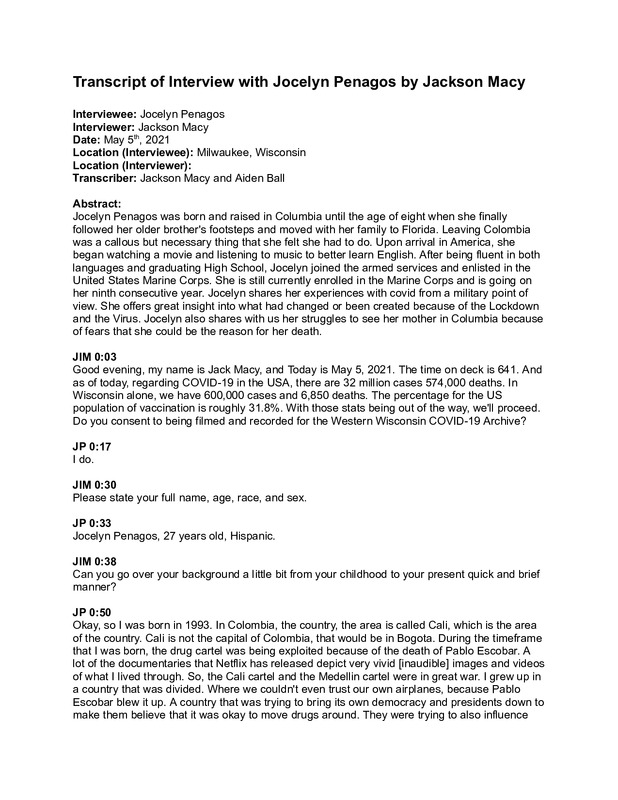 05/05/2021
05/05/2021Jocelyn Penagos Oral History, 2021/05/05
Jocelyn Penagos was born and raised in Columbia until the age of eight when she finally followed her older brother's footsteps and moved with her family to Florida. Leaving Colombia was a callous but necessary thing that she felt she had to do. Upon arrival in America, she began watching a movie and listening to music to better learn English. After being fluent in both languages and graduating High School, Jocelyn joined the armed services and enlisted in the United States Marine Corps. She is still currently enrolled in the Marine Corps and is going on her ninth consecutive year. Jocelyn shares her experiences with covid from a military point of view. She offers great insight into what had changed or been created because of the lockdown and the virus. Jocelyn also shares with us her struggles to see her mother in Columbia because of fears that she could be the reason for her death. -
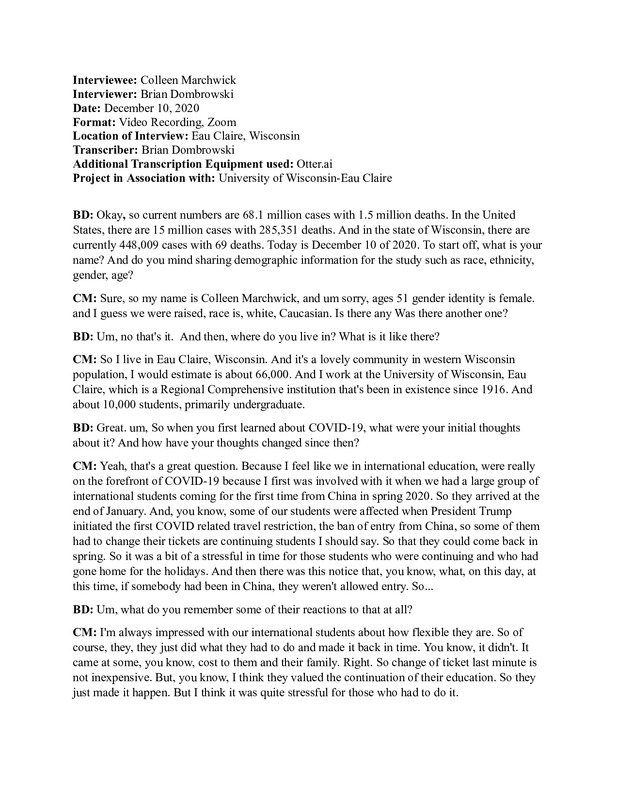 12/10/2020
12/10/2020Colleen Marchwick Oral History, 2020/12/10
-
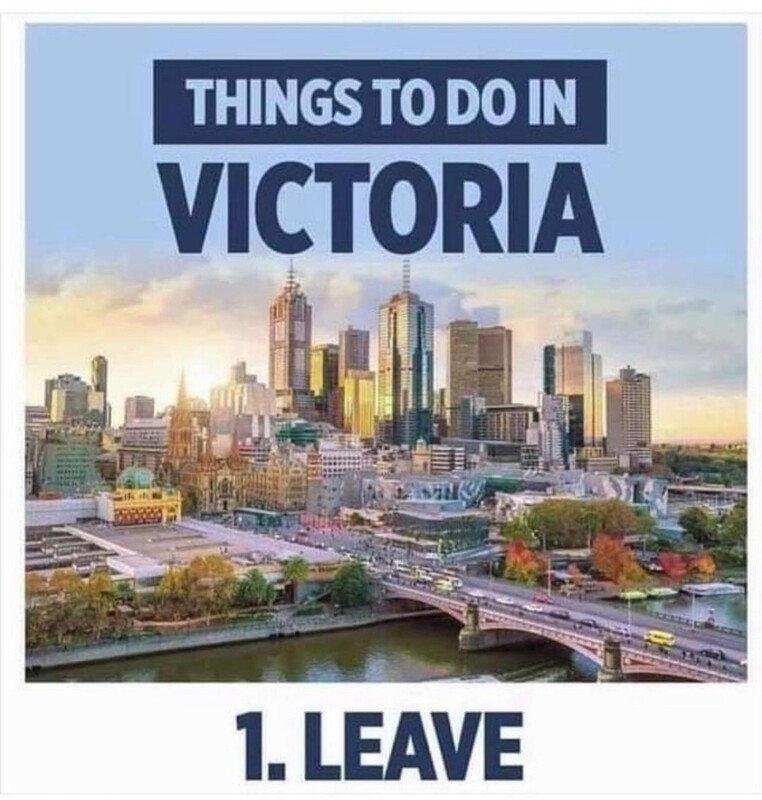 2021-10-29
2021-10-29(HIST30060) Leaving Victoria
HIST30060. This meme highlights how many Victorians felt after enduring the longest duration of lockdowns in the world. Between March 2020 and October 2021, 254 days in total were spent in some form of lockdown in the pursuit of ‘elimination’ – the attempt eradicate COVID-19 from society completely. Whilst seemingly satirical, this meme alludes to a hidden truth. 43,000 Victorians left the state during the two-year pandemic according to the Australian Bureau of Statistics (ABS). Whilst seemingly small relative to Victoria’s 6.6million population, the amount of people that left Victoria was the equivalent of the entire City of Wodonga leaving the state. No other state or territory recorded a reduction in population, especially on this scale. -
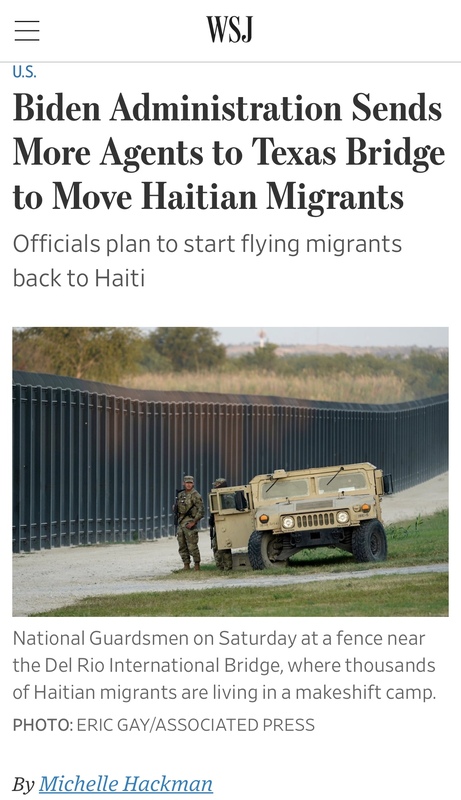 2021-09-18
2021-09-18Biden Administration Sends More Agents to Texas Bridge to Move Haitian Migrants
It is utterly dismal that this is taking place, and being written about, as if it were compartmentalized from the crisis of mass death facing the entire planet. Face masks are required on all U.S. public transit and on all flights, yet migrants seeking asylum are treated without regard for even their bare minimum safety. -
2021-09-30
A YEAR IN LEBANON WITH COVID-19
It all started suddenly. I was visiting my family in the states during Christmas break 2019; everything was perfect life was just fine, and my vacation had to end as planned. I packed my luggage flew back to Sidon, Lebanon, where my husband was waiting for me. I got married in August 2020. I had to leave the state, settle down with my husband, and work because he did not have a green card or American visa. After a few months passed, I decided during the holiday break to visit the U.S. and apply for my husband's alien visa, which is what I did. I went back to my work in Lebanon in the American school after the Christmas break. Our school started again, but all children were sick every day; one of the children did not come at the end of January; almost all the class were absent for a long time. It was the beginning of an immense tragedy. All the news started talking about a new virus spreading fast around the world. I did not even think one percent of the virus would spread worldwide, which was only the beginning of the covid-19 pandemic. The economic situation in Lebanon was destroying every day, and many revolutions plus when covid-19 began, it started to get worst every day. We did not know what to expect my family away from me, which made me more anxious. Our school received a letter from the secretary of education all schools must shut down in two days or less, and this was the situation around the world, not only in Lebanon. By the beginning of February, all schools, government places, even private, malls almost the whole country shut down for more than six months completely. The street was like a horror movie. My life routine got missed up, and the entire planet, many people lost their lives and the people of my family as well. I was so worried about my family, praying that nothing would happen to them, especially I was away. I did not even work from home because I was only a teacher assistant nothing much left to do; even the gym closed, so I started working out at home. One day my lawyer called from the states and told me my husband's case pended because the immigration was closed till further notice, my mental health was distorted and duplicate as well my husband. Due to my husband is a refuge and has no citizen, we could not do anything about it besides waiting. Days passed by, and the situation was getting worse, and nothing was changing. August 4, 2020, we went to my family law spent the day there. Everyone likes to nap through the day, and this was what we were about to do till a one-time big explosion happened in Beruit, Lebanon Hundreds of people lost their lives the country got into a whole tragic pandemic plus outbreak. Two days later, we received an email from the U.S.CIS asking for the rest of the documents to make an interview appointment. We received another email that said my husband's interview would be on November 15. I felt that everything was going in the right direction after months of depression, especially with the covid-19 pandemic and the economic and political situation. Life in Lebanon is not safe for living anymore. There was a lockdown from nowhere; the governor used to pick random days for the lockdown as if it was a puzzle. A day before the interview, the Immigration lawyer called asking me if we received an email about canceling the interview, which I did has no idea what was going on. I was crying so hard felt like life would remain this way called the embassy emergency said, we can not help; this is an emergency for life and death. It would be best if we waited till they decided on a new interview appointment. We got into a massive fight with my husband called my family crying nonstop, telling them how much I missed them and wanted to come back home. Covid-19 is a curse destroying our dreams. I emailed the embassy hundreds of times and called the immigration office in NYC, but nothing they could do for me. I asked them why the embassy canceled my husband's interview, and the answers were like the covid lockdown. They told me you could leave Lebanon and come back without your husband. I would never leave him behind depressed. The next day I received an email that I needed to keep checking the embassy's available interview days, and this is what we kept doing. We felt like we were hopeless and had no more powers. One day at night, my husband told me to check if anything was available for December because the rest of November days are unavailable. We were lucky enough to find one on December 9, 2021. We were so worried about getting canceled again, but luckily it did not, few days passed, and the date had come he got the visa, and obviously, they did not allow me into the embassy due to covid-19. We waited a week to get his passport back. Once we received it, it booked tickets right away and flew to New York. It was the first time for us traveling during covid-19, nothing is easy PCR test is required even though no one asked for it, we wore the face mask for almost 24hours it felt like hell. We arrived safely in the states after months of struggling. We asked not to leave the house for 15 days, filled an application with our phone numbers and address. Before and after Covid-19, nothing was the same hugging my family after a long time was like heaven. For me being by their side was all I needed during these days. I pray for better days, days without covid-19. -
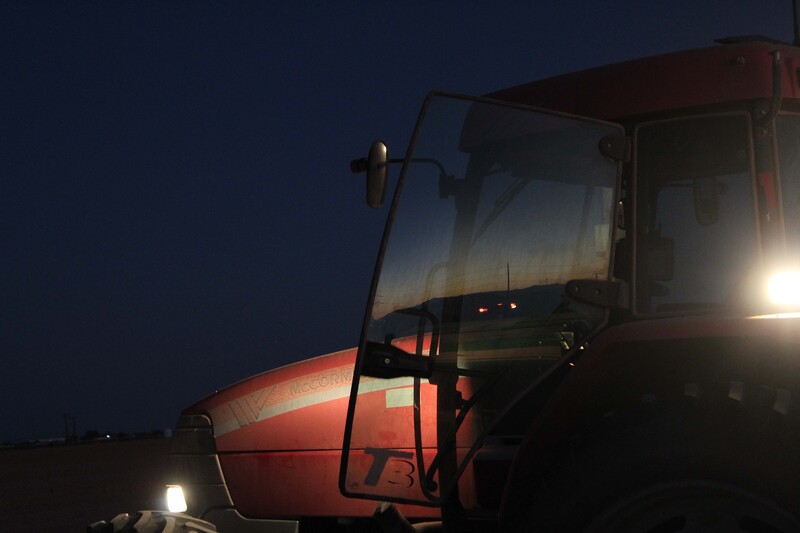 2020-10-28
2020-10-28The Minimum Wage Spotlight
The photographic story I've uploaded is about my [family member], Andres, who even with the pandemic at its worst peak, in 2020, had to continue in his job. He's an Arizona field laborer, a key worker for the farm he works in. The conditions are difficult, with a minimum wage that doesn't match the amount of work he does. As the photos indicate, his job can start at a very early time when the sun hasn't even risen. His job usually lasts 12 hours, so when it's the night shift, he doesn't come back till the morning hours. There are weeks when he has to stay inside a hot tractor for hours and there are other days when he has to do a lot of moving and carrying around. Due to the difficult weather Arizona may have, there’s a constant danger of heatstroke especially since a lot of his work includes physical labor. Looking deeper, these pictures of the work Andres does feels like a representation of the unequal power there is in the minimum wage system. Here we have a field laborer, who due to lack of education and financial resources growing up, wasn’t able to reach for higher positions that require degrees. He grew up in a poverty-stricken family and alongside being a Latino immigrant, opportunities were few and far between so in order to assure he keeps himself and his family fed and sheltered, so he’s forced to continue a job that doesn’t contain the best conditions or pay. This is only emphasized within the pandemic, minimum wage workers forced to continue working in bad conditions including the risk of getting sick because, in order to keep their head above water, they must. And yet, even with all the dangers and the long hours, their pay doesn’t reflect the job. This also connects to race, minorities most of the time stuck in these places due to the disadvantages they grew up with and continue to face. It’s the life of an individual who is input in a life in which already starts with less compared to privileged others, and then a pandemic hits which only emphasizes the disadvantages already there. Overall, the pandemic truly has put a spotlight on the many issues society already had. -
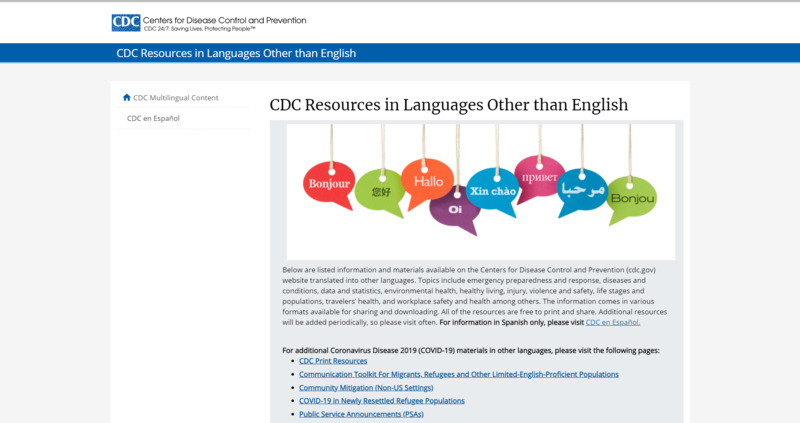 2021-07-22
2021-07-22CDC Resources in Languages Other Than English
Information on COVID-19 must be available to all individuals if the US as a society and as a country are to successfully deal with this virus and prevent deaths and illness. This information must be available in a variety of languages other than English to meet the needs of those who are not proficient in the English language. The CDC created a website with a wealth of information and materials for individuals in languages other than English, including materials for migrants and refugees. The CDC also has a website for Spanish-speaking individuals. -
 2021-06-11
2021-06-11hermit HERALD, ISSUE 117
COVID 19 AND EVOLVING SCIENCE -
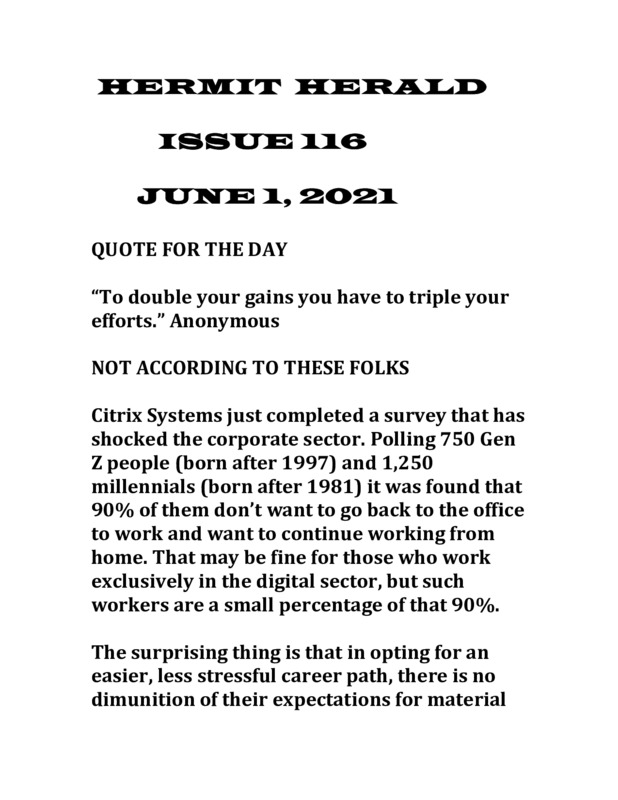 2021-06-01
2021-06-01hermit HERALD, ISSUE 116
Ransomware made easy -
 2020-05-12
2020-05-12Anti-immigrant protest outside of hotel that is housing migrant families
I was driving back from the library and saw this protest with no masks outside of a hotel that ICE is holding migrant families. They were waving American flags and had signs that said things like "America First", "Biden = Cartel", etc. -
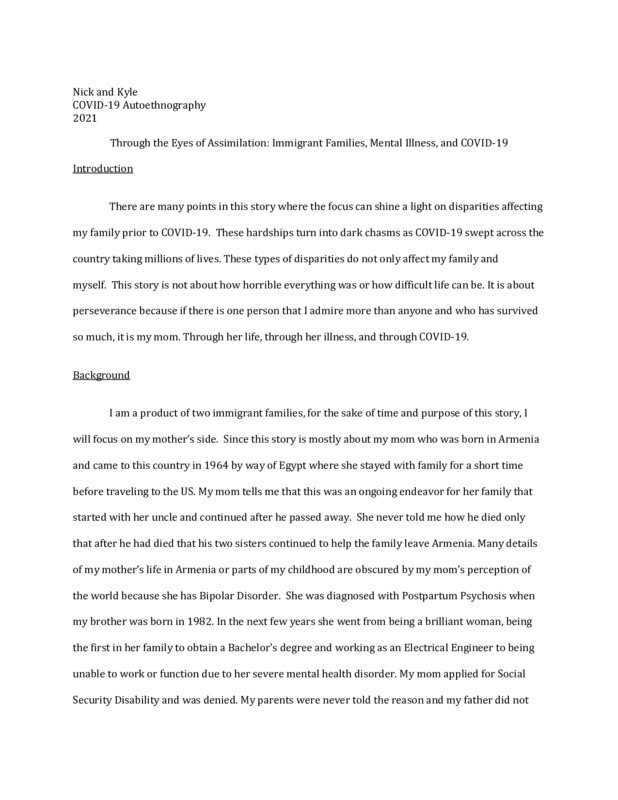 2020-05-09
2020-05-09Through the Eyes of Assimilation: Immigrant Families, Mental Illness, and COVID-19
This story is about my partner's family, utilizing both of our perspectives to talk about how his mother, and subsequently my partner, was treated due to mental illness, ethnicity, and gender identity. -
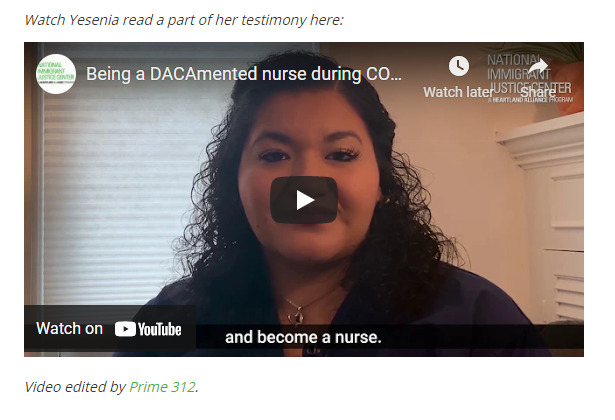 2020-06-19
2020-06-19DACA On The COVID-19 Ward: Yesenia's Story
My name is Yesenia, and I am a DACA recipient and a nurse. As of a few weeks ago, I have been a nurse primarily in the COVID-19 unit at my local hospital in Indiana, where I live. Since COVID-19 began, my world, along with everyone else's, has been flipped upside down. It is hard to express how much my job has changed since COVID-19. I knew when I went into critical care nursing that I would have unexpected situations at work. I never thought there would be a whole floor of uncertainties. It is really overwhelming when you know that you are not enough for what is to come. But you always try your best. -
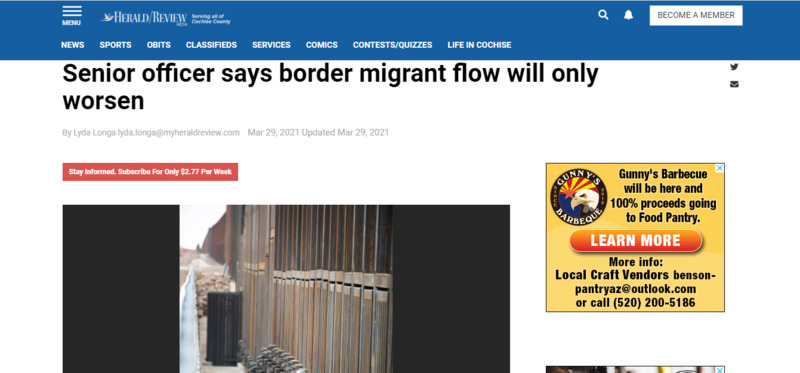 2021-03-29
2021-03-29Senior Border Patrol officer says border migrant flow will only worsen
"Senior officer says border migrant flow will only worsen" By Lyda Longa, lyda.longa@myheraldreview.com, Mar 29, 2021 The situation with undocumented migrants flocking to the Southwest border of the United States from Mexico is only going to worsen, a senior Border Patrol agent warned Friday. The agent, who spoke to various media outlets during a conference call, said at least 380,000 undocumented people had been apprehended at the Southwest border in February and the numbers would be higher for March and beyond. The agent spoke on background with the agreement that media would not reveal his name. “I fully expect to see the numbers increase as we go into the summer months,” the senior agent said, concerning migrant crossings. In Cochise County that warning has begun to bear out near Douglas and in Willcox, where the already stretched-thin Border Patrol is arresting more single adults attempting to slip into the country or taking in and processing children who are flocking to the border unaccompanied. Douglas Mayor Donald Huish said Friday the latest information he received this week from Border Patrol agents at the station just outside Douglas is that they’re confronting and repatriating about 100 single adults daily who are trying to slip in illegally. “They are getting closer and closer to town,” Huish said. What concerns Huish even more is that Border Patrol agents from the Douglas station are being pulled out to help in busier areas such as Yuma and Tucson. “They’re siphoning them off to the western part of the state and leaving us with a skeleton crew,” Huish said. In Willcox, Mayor Mike Laws said he was told two weeks ago by the Border Patrol there were 54 unaccompanied children at the Border Patrol station. “That was two weeks go. Who knows now?” Laws said. “The station can only hold up to 81.” Laws said he was told by Border Patrol that a “third party” has been arriving at the facility and taking 10 to 20 children to Phoenix by via bus. The mayor said he does not know how often the transportation comes or who the third party is. “We have not seen anyone (undocumented migrants) running the streets so far,” Laws said. “All we have is the youths, but we don’t see them either.” Laws and Sierra Vista Mayor Rick Mueller said citizens in their respective communities would gladly help the undocumented migrants but there aren’t enough resources available to do so. Laws, Mueller and other mayors in Cochise County signed a letter recently asking the federal government for help with the matter. Last week, the town of Gila Bend, which has a population of about 2,000, declared an emergency after Border Patrol agents dropped off a group of migrant families with children in a park. Gila Bend Mayor Chris Riggs told reporters he and his wife ended up using loaned vans to drive the families to the Phoenix Welcome Center so they would have a safe place to stay. Riggs said Border Patrol agents told him to expect more of the same. Mueller said there have been no such issues in Sierra Vista, but he is worried that the municipality, if hit with something similar to what happened in Gila Bend, would have no resources to offer. Last week Arizona senators Kyrsten Synema and Mark Kelly announced they’ve been pushing for more federal resources to help Arizona cities with a sudden influx of undocumented migrants. The senators helped secure at least $110 million from the Federal Emergency Management Agency as reimbursement to cities that assist migrants left within their jurisdictions. Also last week, Arizona Gov. Doug Ducey and Florida Senator Rick Scott — who sits on the Homeland Security Committee — called on President Joe Biden and Department of Homeland Security Secretary Alejandro Mayorkas to visit the Southwest border. Ducey and Scott, accompanied by a handful of law enforcement and other elected officials, had toured a portion of the border near Douglas. At his first press conference on Thursday since taking office in January, Biden said he would come to the border soon, but thought a visit now would deflect attention from the issue at hand. The senior Border Patrol agent who spoke Friday, meanwhile, said 300 Border Patrol agents who work along the northern border of the U.S. have been “mandated” to the Southwest border to assist with the influx of migrants. He said about 2,000 family units out of the 6,000 who are trying to cross daily are being processed in Texas by the Border Patrol. The agent revealed that unaccompanied children are being kept in Border Patrol facilities longer than the 72 hours established by law because too many are showing up and agents are overwhelmed. “They’re keeping them a few days, sometimes up to a week,” the senior agent said. Once an unaccompanied child is encountered, Border Patrol contacts the Department of Health and Human Services. The latter makes arrangements for the migrant children to be taken by the Office of Refugee Resettlement. The agent also mentioned an increase in the criminal element among undocumented migrants. “The threats we see are significant,” the senior agent said. “We have seen criminal (undocumented migrants).” Additionally, he said that COVID testing for migrants is only being done in facilities in Del Rio, Texas, and soon in the Rio Grande Valley in Texas. Other than that, testing is being undertaken by non-governmental agencies that are helping the migrants and U.S. Immigrations and Customs Enforcement officials. He said it was probable that some migrants with COVID-19 may have been released into communities. -
 2021-03-27
2021-03-27hermit HERALD, ISSUE 106
Biden $3 trillion Build Back Better plan -
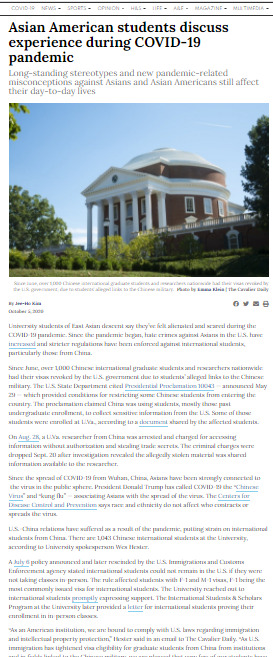 2020-10-05
2020-10-05Asian American students discuss experience during COVID-19 pandemic
Long-standing stereotypes and new pandemic-related misconceptions against Asians and Asian Americans still affect their day-to-day lives. University students of East Asian descent say they’ve felt alienated and scared during the COVID-19 pandemic. Since the pandemic began, hate crimes against Asians in the U.S. have increased and stricter regulations have been enforced against international students, particularly those from China. Since the spread of COVID-19 from Wuhan, China, Asians have been strongly connected to the virus in the public sphere. President Donald Trump has called COVID-19 the “Chinese Virus” and “kung flu” — associating Asians with the spread of the virus. -
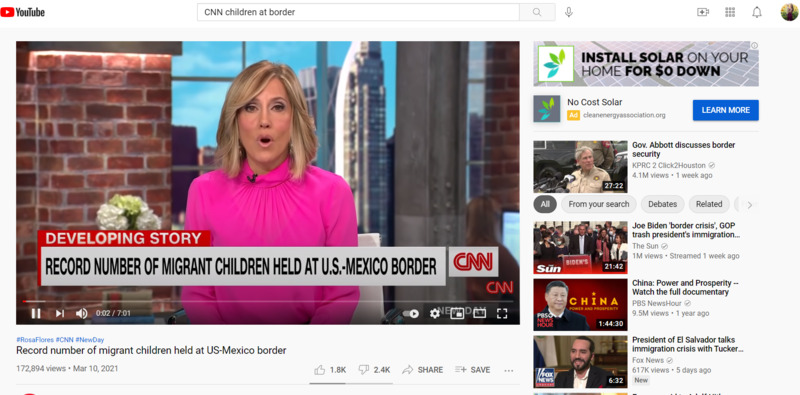 2021-03-10
2021-03-10unaccompanied migrant children in US Border Patrol facilities, which are akin to jail cells
The number of unaccompanied migrant children in US Border Patrol facilities, which are akin to jail cells and not intended for kids, has reached dramatic highs, according to internal agency documents reviewed by CNN, underscoring the urgent challenge facing the Biden administration. More than 3,200 unaccompanied migrant children were in Customs and Border Protection custody, according to the documents dated Monday. Of those, around 2,600 were awaiting placement in shelters suitable for minors, but there were just over 500 beds available to accommodate them. The latest data comes on the heels of a trip to the US-Mexico border by senior administration officials to assess the situation on the ground amid an increasing number of arrests and indicates a rapidly increasing trend of unaccompanied children coming into the US. Less than a week ago, there were around 1,700 children in Border Patrol custody. -
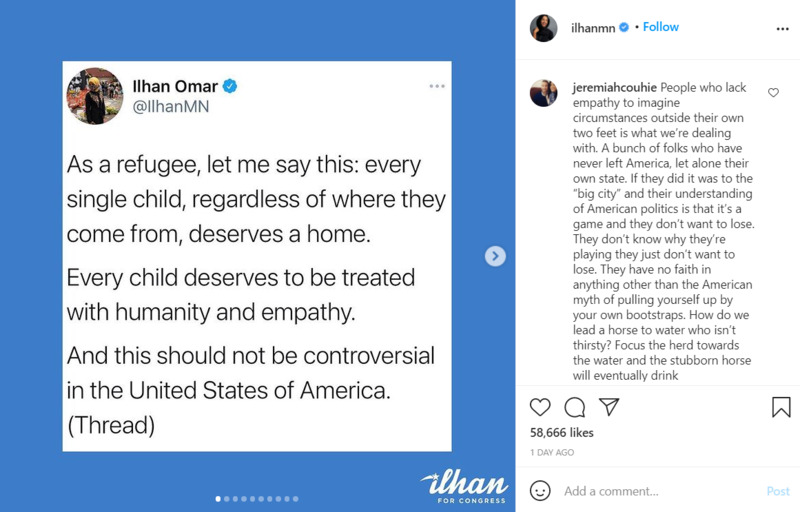 2021-03-21
2021-03-21Ilhan Omar Thread on Current Border Policy
People who lack empathy to imagine circumstances outside their own two feet is what we’re dealing with. A bunch of folks who have never left America, let alone their own state. If they did it was to the “big city” and their understanding of American politics is that it’s a game and they don’t want to lose. They don’t know why they’re playing they just don’t want to lose. They have no faith in anything other than the American myth of pulling yourself up by your own bootstraps. How do we lead a horse to water who isn’t thirsty? Focus the herd towards the water and the stubborn horse will eventually drink -
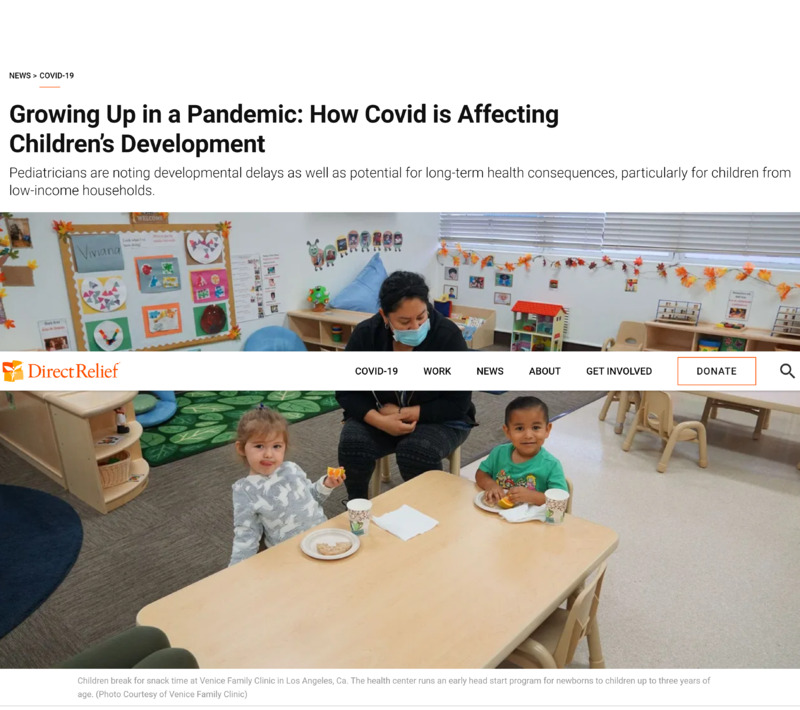 2021-01-19
2021-01-19How does the pandemic affect children?
This link provided explains how the pandemic is affecting the development of children. -
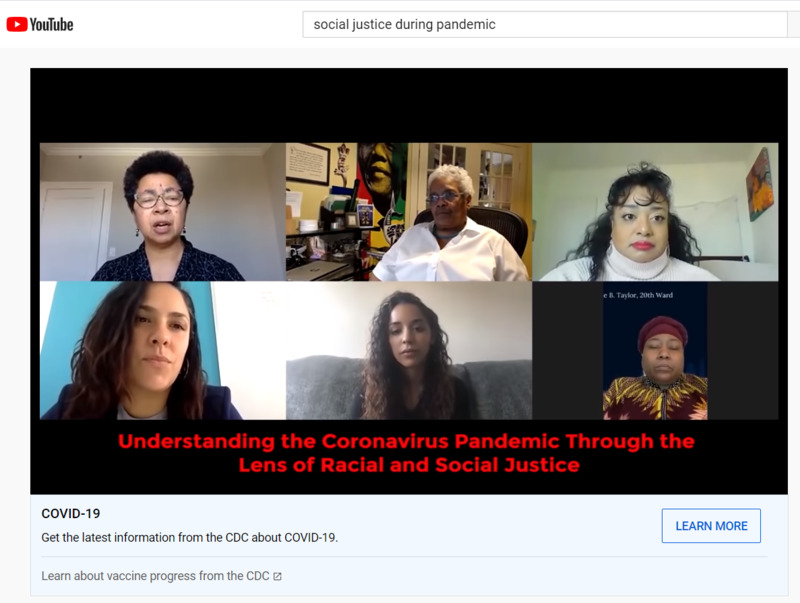 2020-04-22
2020-04-22Understanding the Corona Virus Through the Lens of Racial and Social Justice
The Institute for Research on Race and Public Policy and the Social Justice Initiative host a conversation on the Coronavirus Pandemic through the Lens of Racial and Social Justice. Moderated by Barbara Ransby from the Social Justice Initiative, panelists include Dr. Linda Rae Murray, Aislinn Pulley from Chicago Torture Project, Ald. Rossana Rodriguez, Ald. Jeanette Taylor, Detention Watch Network's Gaby Viera and Reyna Wences from Organized Communities Against Deportations. This program was edited by CAN TV -
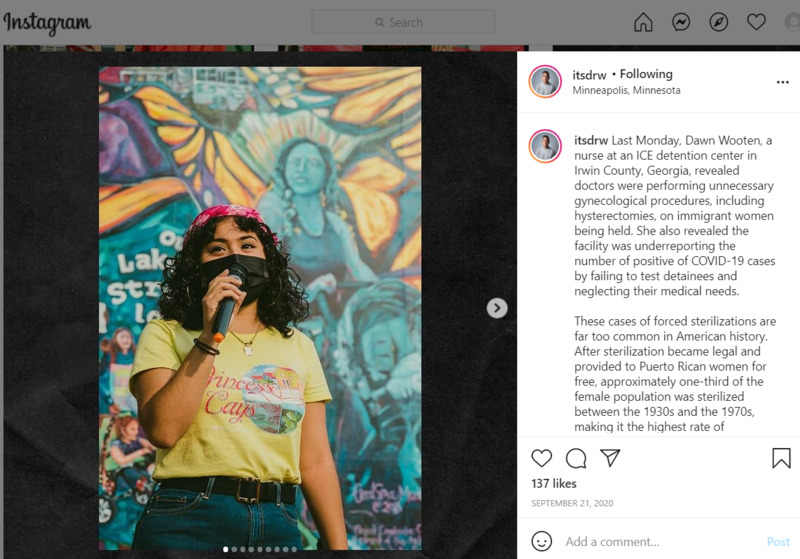 2020-09-21
2020-09-21Protests against ICE, Forced Sterilization and Under Reporting of Covid-19 Cases in Detention Centers
Last Monday, Dawn Wooten, a nurse at an ICE detention center in Irwin County, Georgia, revealed doctors were performing unnecessary gynecological procedures, including hysterectomies, on immigrant women being held. She also revealed the facility was underreporting the number of positive of COVID-19 cases by failing to test detainees and neglecting their medical needs. These cases of forced sterilizations are far too common in American history. After sterilization became legal and provided to Puerto Rican women for free, approximately one-third of the female population was sterilized between the 1930s and the 1970s, making it the highest rate of sterilization in the world. Health workers encouraged the procedure through door-to-door visits and employers showed favoritism towards sterilized women. I highly recommend a short documentary called La Operación available online about this US-imposed sterilization policy in Puerto Rico. -
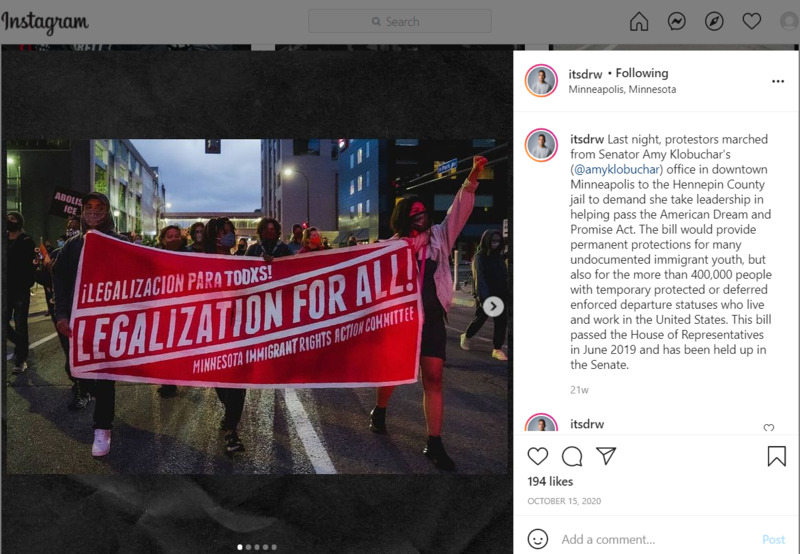 2020-10-15
2020-10-15Demand to Pass the American Dream and Promise Act
Last night, protestors marched from Senator Amy Klobuchar's (@amyklobuchar) office in downtown Minneapolis to the Hennepin County jail to demand she take leadership in helping pass the American Dream and Promise Act. The bill would provide permanent protections for many undocumented immigrant youth, but also for the more than 400,000 people with temporary protected or deferred enforced departure statuses who live and work in the United States. This bill passed the House of Representatives in June 2019 and has been held up in the Senate. -
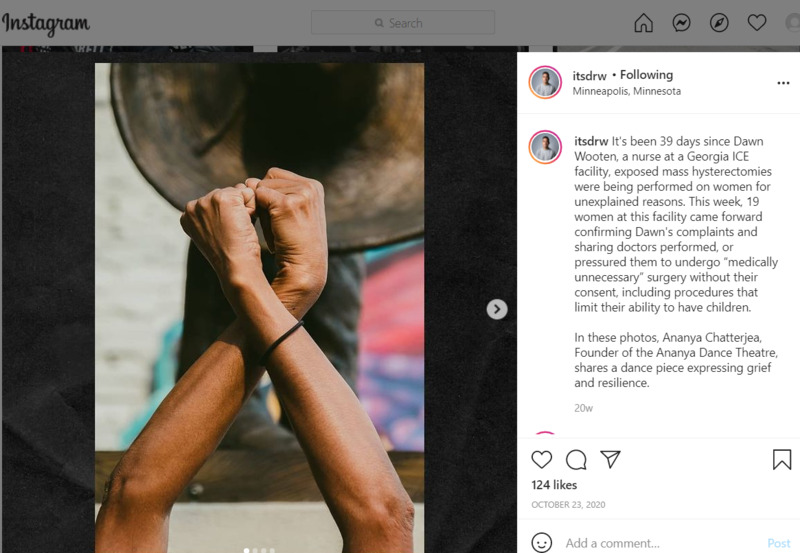 2020-10-23
2020-10-23Dance to Express Grief
It's been 39 days since Dawn Wooten, a nurse at a Georgia ICE facility, exposed mass hysterectomies were being performed on women for unexplained reasons. This week, 19 women at this facility came forward confirming Dawn's complaints and sharing doctors performed, or pressured them to undergo “medically unnecessary” surgery without their consent, including procedures that limit their ability to have children. In these photos, Ananya Chatterjea, Founder of the Ananya Dance Theatre, shares a dance piece expressing grief and resilience. -
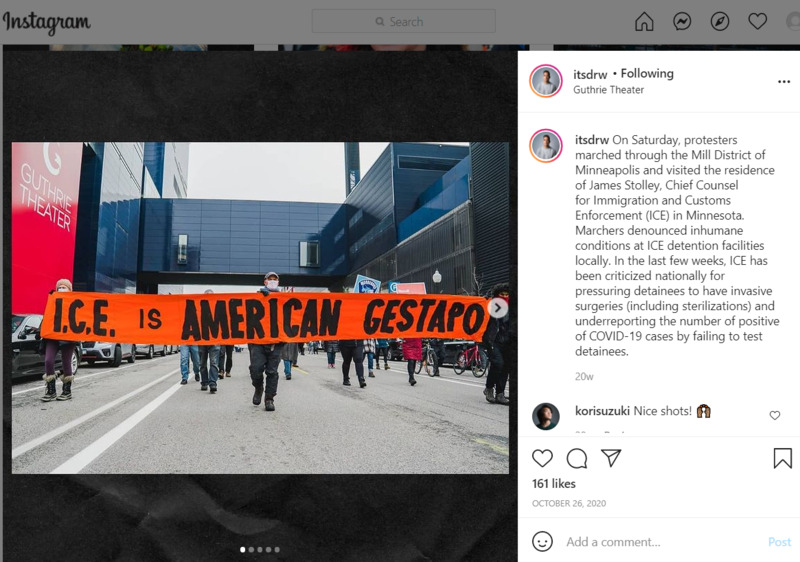 2020-10-26
2020-10-26Protesters Denounce Inhumane Conditions at ICE Detention Facilities
On Saturday, protesters marched through the Mill District of Minneapolis and visited the residence of James Stolley, Chief Counsel for Immigration and Customs Enforcement (ICE) in Minnesota. Marchers denounced inhumane conditions at ICE detention facilities locally. In the last few weeks, ICE has been criticized nationally for pressuring detainees to have invasive surgeries (including sterilizations) and underreporting the number of positive of COVID-19 cases by failing to test detainees. -
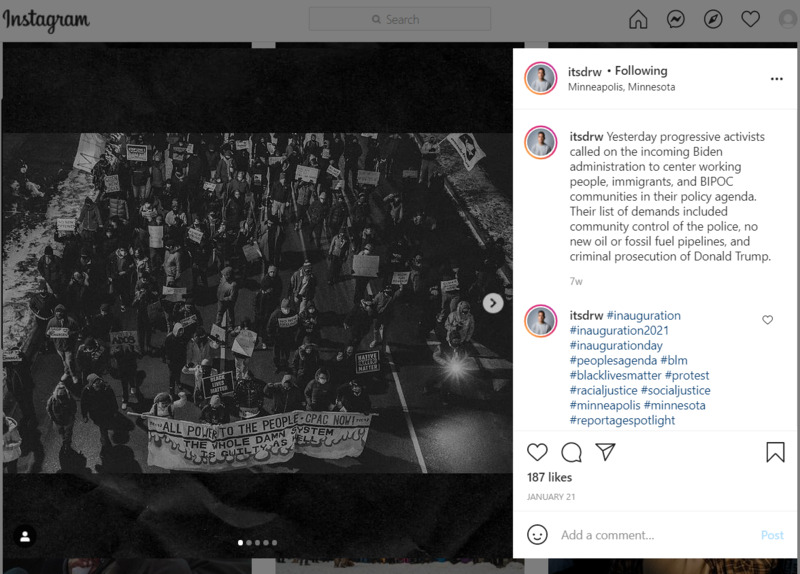 2021-01-21
2021-01-21Progressive Activists Call on Biden Administration
Yesterday progressive activists called on the incoming Biden administration to center working people, immigrants, and BIPOC communities in their policy agenda. Their list of demands included community control of the police, no new oil or fossil fuel pipelines, and criminal prosecution of Donald Trump. -
 2021-02-28
2021-02-28hermit HERALD, ISSUE 103
Senator Murphy urges U.S. stop supporting allies in Mideast proxy wars -
 2021-02-16
2021-02-16HERMIT HERALD, ISSUE 101
TRUMP,impeachment wrap up -
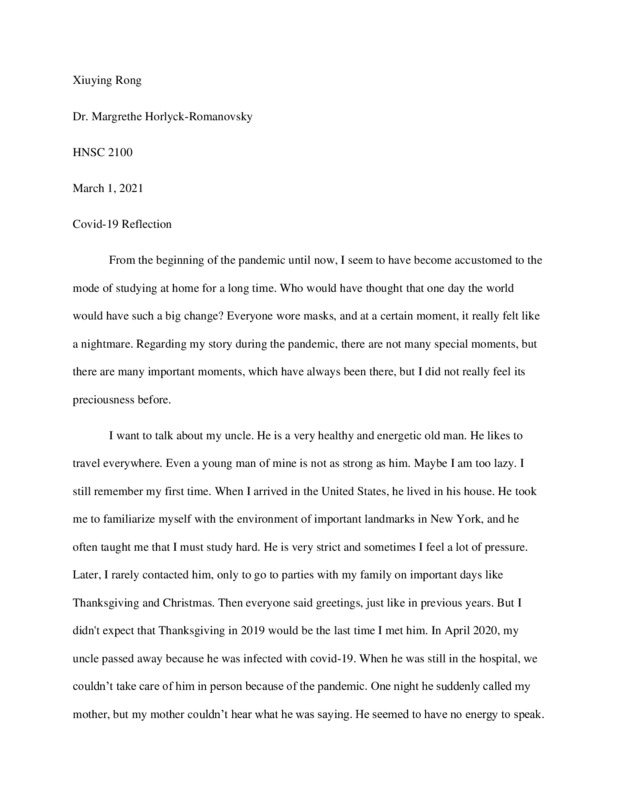 2020-04-12
2020-04-12Living in a pandemic
Losing opportunities and losing family makes us think about many emotions and things that should be cherished. -
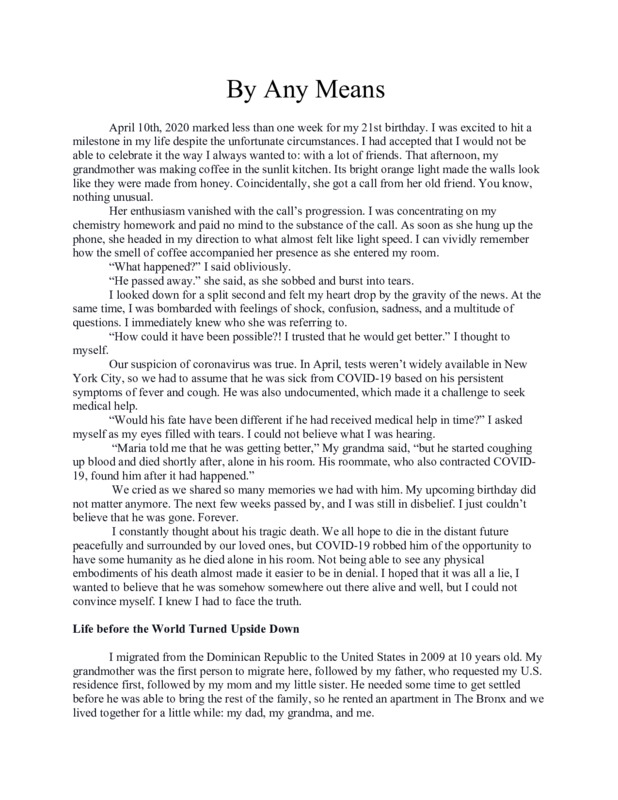 2021-01-20
2021-01-20By Any Means
I lost a father figure during the pandemic who also happened to be undocumented. I connected his life and experience to the overall struggle that undocumented people have been facing due to the pandemic. I also emphasized on their perseverance to survive the COVID-19's financial catastrophe by using one of the few options that they have available: street vending. In general, it reveals the systemic denial of the resources that are essential to surviving the pandemic to undocumented workers, even if they are tax-paying individuals. -
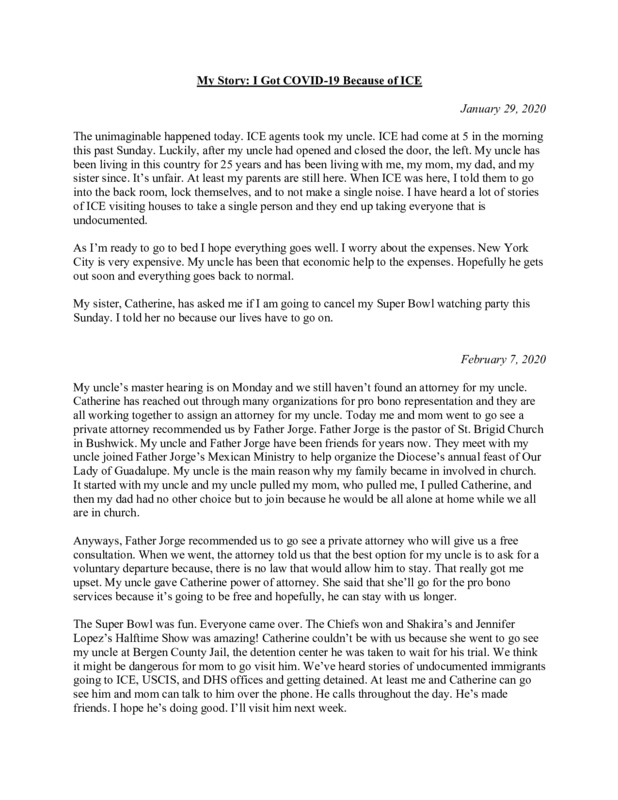 2021-02-14
2021-02-14My Story: I Got COVID-19 Because of ICE
I am sending a diary style writing where I share my experience during the pandemic. I focus on the issue of ICE during the pandemic. Before the lockdowns, my uncle was detained by ICE and was deported during the pandemic. My uncle has been living in the US for 25+ years and Mexico, my uncle's home country, has changed a lot since he last lived there. For that reason, I went to Mexico to take him home. This made me get COVID. -
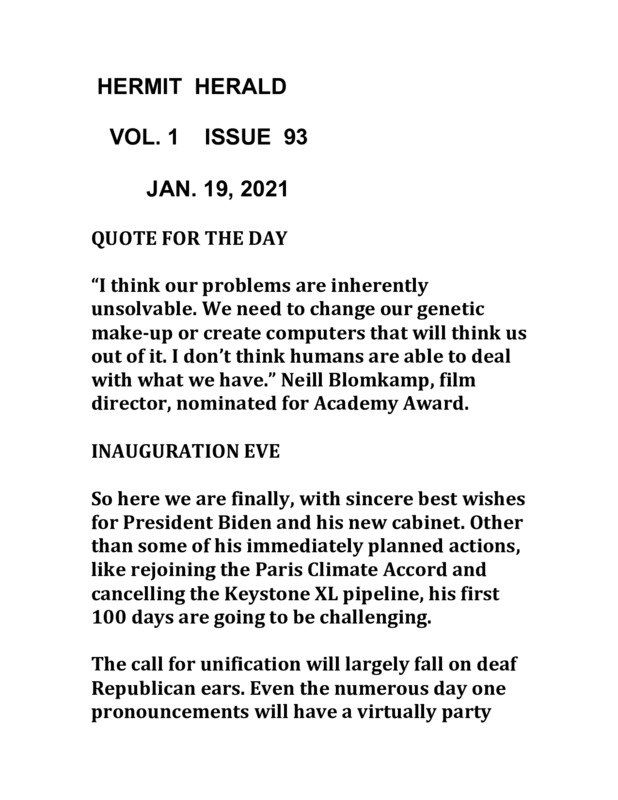 2021-01-19
2021-01-19HERMIT HERALD, ISSUE 93
Inaguration eve -
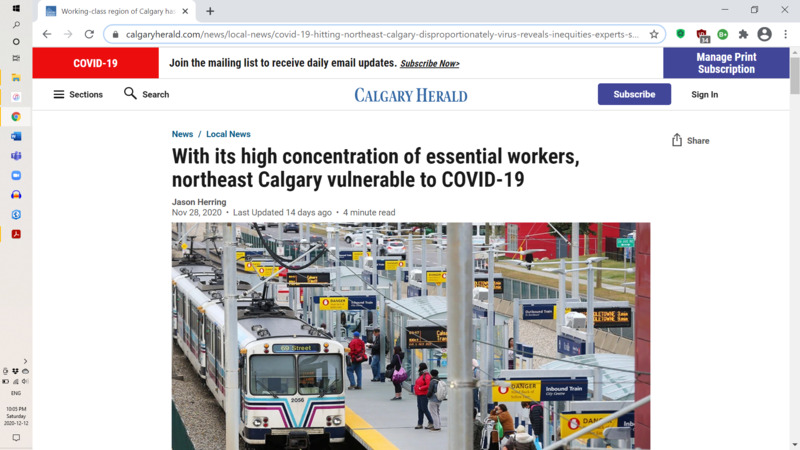 2020-11-28
2020-11-28With its high concentration of essential workers, northeast Calgary vulnerable to COVID-19
Article on how a small town copes with the pandemic -
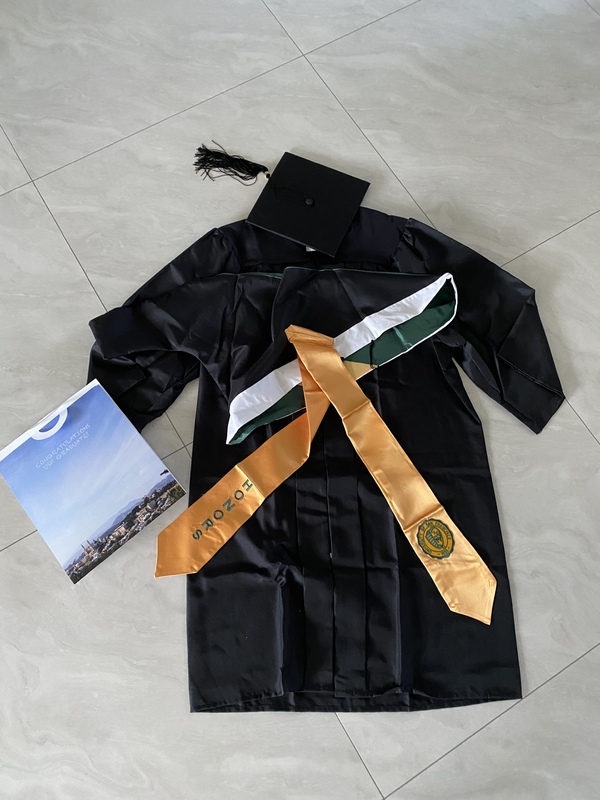 2020-12-01
2020-12-01Graduation pack
Since the graduation has been canceled due to COVID-19, the graduation package had to be shipped to students and let us keep it until it is safe to hold the actual ceremony on campus. I received mine on Dec. 1st, the ceremony was supposed to be hold on Dec. 12 online. I don’t know if the ceremony will be hold in the near future, but I believe that it won’t be what we’ve imagined it. I won’t be able to see all my friends together again, some of us graduated and went to other countries because of the unfriendly policy to international students, and I don’t even know if I will ever see them again. -
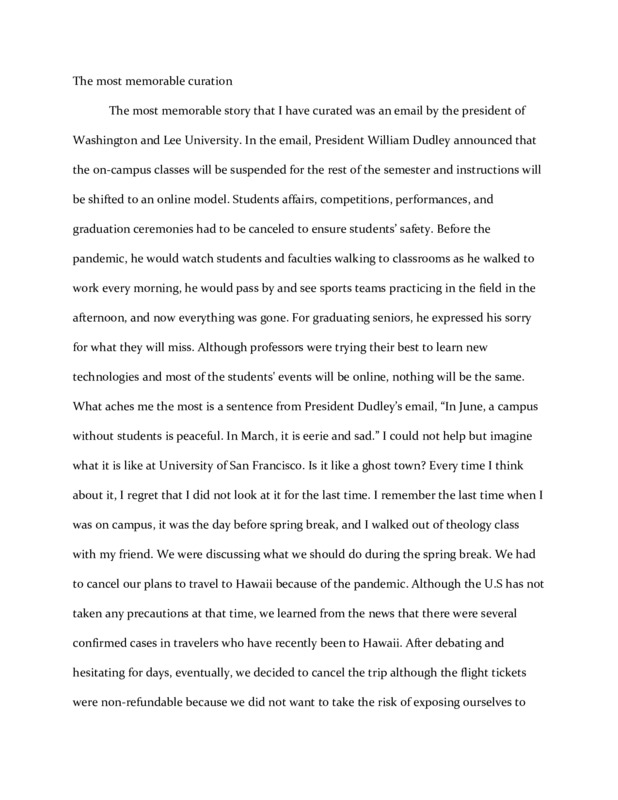 2020-12-10
2020-12-10The most memorable curation
The most memorable story that I have curated was an email by the president of Washington and Lee University. In the email, President William Dudley announced that the on-campus classes will be suspended for the rest of the semester and instructions will be shifted to an online model. Students affairs, competitions, performances, and graduation ceremonies had to be canceled to ensure students’ safety. Before the pandemic, he would watch students and faculties walking to classrooms as he walked to work every morning, he would pass by and see sports teams practicing in the field in the afternoon, and now everything was gone. For graduating seniors, he expressed his sorry for what they will miss. Although professors were trying their best to learn new technologies and most of the students' events will be online, nothing will be the same. What aches me the most is a sentence from President Dudley’s email, “In June, a campus without students is peaceful. In March, it is eerie and sad.” I could not help but imagine what it is like at University of San Francisco. Is it like a ghost town? Every time I think about it, I regret that I did not look at it for the last time. I remember the last time when I was on campus, it was the day before spring break, and I walked out of theology class with my friend. We were discussing what we should do during the spring break. We had to cancel our plans to travel to Hawaii because of the pandemic. Although the U.S has not taken any precautions at that time, we learned from the news that there were several confirmed cases in travelers who have recently been to Hawaii. After debating and hesitating for days, eventually, we decided to cancel the trip although the flight tickets were non-refundable because we did not want to take the risk of exposing ourselves to the virus. Every Chinese student I knew made the same decision. What happened to our home country made us realize how harmful this virus could be. On the way walking out of the campus, I was texting and discussing should we stock some disinfectant and stay at home for the whole spring break with my friend, I could never imagine that it was the last time I walked on campus and saw USF. It hurts my heart when I try to remember what it was like to walk on campus, how the St. Ignatius Church would shine under the sunset; I hate myself for not looking at everything for the one last time because I was busy texting. Shortly, USF announced online classes for the rest of the semester and I returned to China within weeks. When the fall 2020 semester was announced to be online, I first made the decision to take a gap semester because I want to spend my last semester with friends, and most importantly, to celebrate the graduation ceremony with my friends and family on campus. However, with the U.S. government putting visa restrictions on Chinese and the conflict between the U.S and China getting more serious, I began to fear that if I do not complete my degree now, there could be a possibility that I never would. Yesterday, I finished my last class in college life and my virtual graduation ceremony is only days away. I envy those seniors who graduated before me, they had a chance to celebrate with families and friends, they had a chance to say goodbye to their college life; I envy those who will graduate in the following years, they will have the chance to celebrate their graduation ceremony on campus. Everything that has ever happened in the past months seems like a dream. Only if I know how to end this dream. -
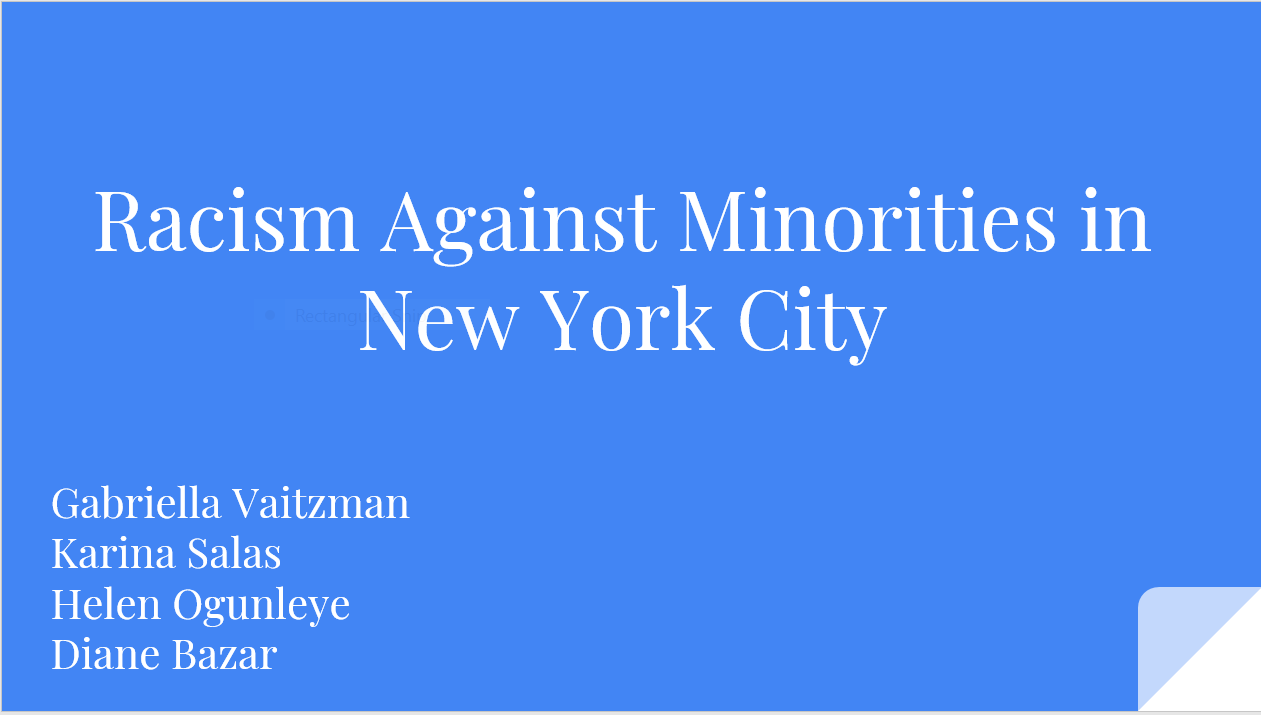 2020-03
2020-03Racism during COVID-19 for minorities
The material presents racism during the Pandemic and how it has affected people from different racial communities like Hispanic Latinos, Asians, and African Americans. -
2020-03-29
Start of 14 days of quarantine
Since March 2020, the Chinese government requires a mandatory 14-day quarantine in hotels for everyone who enters the country to ensure no cases from aboard will cause transmission within the country. This is the confirmation letter that I received after I was placed in the quarantine hotel, it indicates the date and time of my entry and the time of the end of quarantine. -
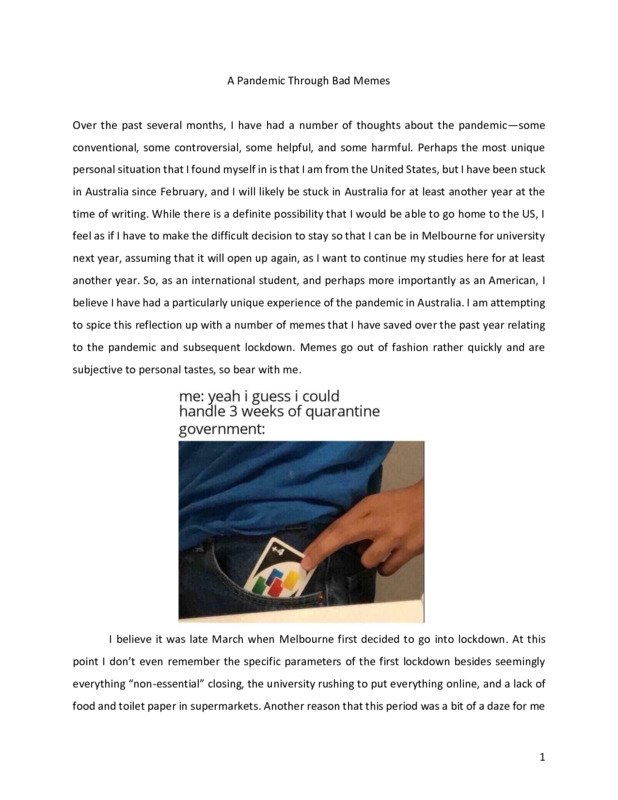 2020-10-17
2020-10-17A Pandemic Through Bad Memes
HIST30060, this is a personal text reflection on my experience in the pandemic complemented by internet memes
